Ethical Issues and Solutions in Financial Accounting: A Report
VerifiedAdded on 2020/02/24
|6
|2102
|305
Report
AI Summary
This report delves into the critical domain of accounting ethics, offering a comprehensive examination of ethical dilemmas within the financial industry. It uses the Lehman Brothers scandal as a compelling case study to illustrate the consequences of unethical practices, such as misrepresentation of financial information, conflicts of interest, and management pressures on accountants. The report further explores various ethical issues, including the responsibilities of individuals, the impact of greed, and the omission of financial records. To address these challenges, the report proposes remedies such as enhanced disclosure, adherence to the Sarbanes-Oxley Act, and implementation of robust accounting codes of conduct. The analysis underscores the importance of maintaining ethical standards and transparency in financial reporting to safeguard stakeholders' interests and promote trust within the business environment.
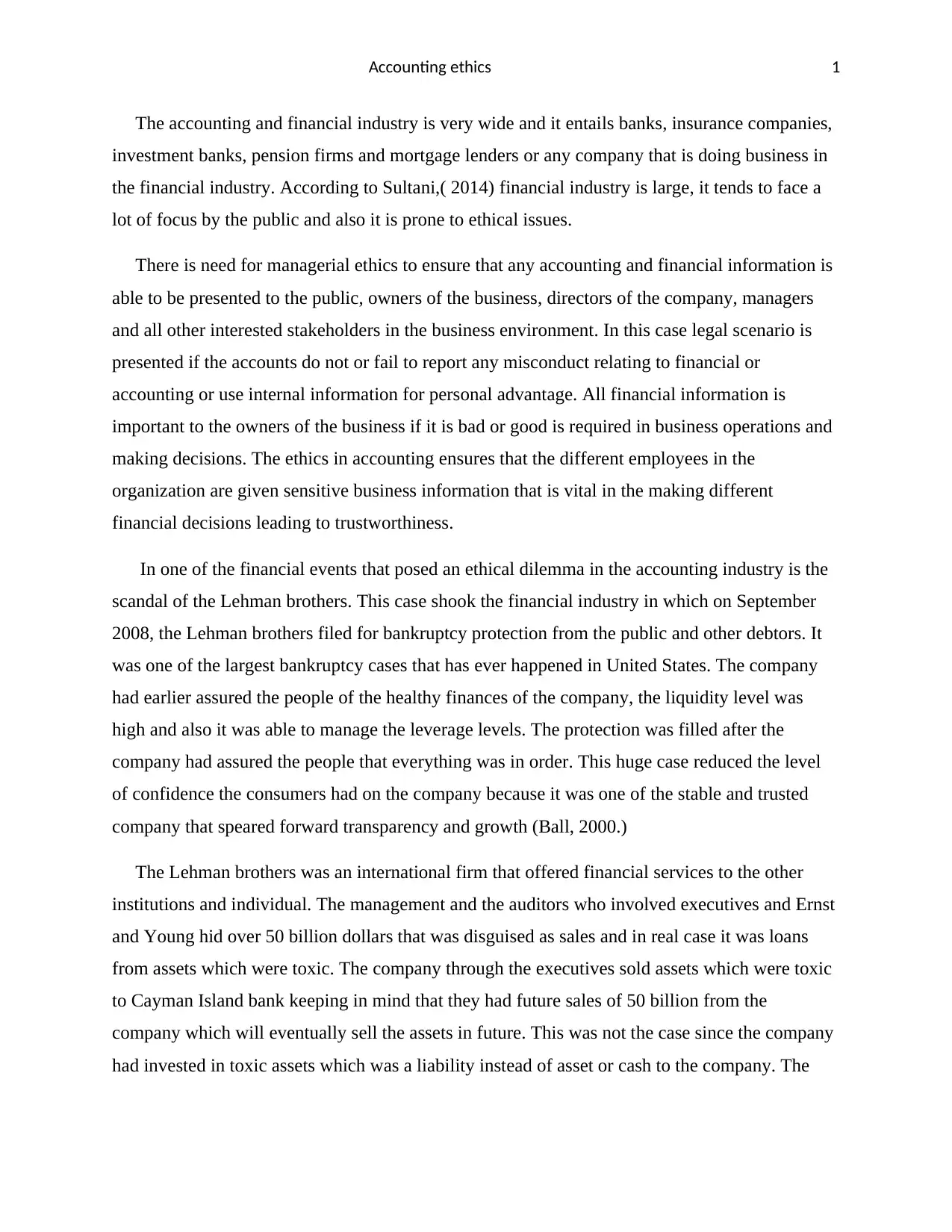
Accounting ethics 1
The accounting and financial industry is very wide and it entails banks, insurance companies,
investment banks, pension firms and mortgage lenders or any company that is doing business in
the financial industry. According to Sultani,( 2014) financial industry is large, it tends to face a
lot of focus by the public and also it is prone to ethical issues.
There is need for managerial ethics to ensure that any accounting and financial information is
able to be presented to the public, owners of the business, directors of the company, managers
and all other interested stakeholders in the business environment. In this case legal scenario is
presented if the accounts do not or fail to report any misconduct relating to financial or
accounting or use internal information for personal advantage. All financial information is
important to the owners of the business if it is bad or good is required in business operations and
making decisions. The ethics in accounting ensures that the different employees in the
organization are given sensitive business information that is vital in the making different
financial decisions leading to trustworthiness.
In one of the financial events that posed an ethical dilemma in the accounting industry is the
scandal of the Lehman brothers. This case shook the financial industry in which on September
2008, the Lehman brothers filed for bankruptcy protection from the public and other debtors. It
was one of the largest bankruptcy cases that has ever happened in United States. The company
had earlier assured the people of the healthy finances of the company, the liquidity level was
high and also it was able to manage the leverage levels. The protection was filled after the
company had assured the people that everything was in order. This huge case reduced the level
of confidence the consumers had on the company because it was one of the stable and trusted
company that speared forward transparency and growth (Ball, 2000.)
The Lehman brothers was an international firm that offered financial services to the other
institutions and individual. The management and the auditors who involved executives and Ernst
and Young hid over 50 billion dollars that was disguised as sales and in real case it was loans
from assets which were toxic. The company through the executives sold assets which were toxic
to Cayman Island bank keeping in mind that they had future sales of 50 billion from the
company which will eventually sell the assets in future. This was not the case since the company
had invested in toxic assets which was a liability instead of asset or cash to the company. The
The accounting and financial industry is very wide and it entails banks, insurance companies,
investment banks, pension firms and mortgage lenders or any company that is doing business in
the financial industry. According to Sultani,( 2014) financial industry is large, it tends to face a
lot of focus by the public and also it is prone to ethical issues.
There is need for managerial ethics to ensure that any accounting and financial information is
able to be presented to the public, owners of the business, directors of the company, managers
and all other interested stakeholders in the business environment. In this case legal scenario is
presented if the accounts do not or fail to report any misconduct relating to financial or
accounting or use internal information for personal advantage. All financial information is
important to the owners of the business if it is bad or good is required in business operations and
making decisions. The ethics in accounting ensures that the different employees in the
organization are given sensitive business information that is vital in the making different
financial decisions leading to trustworthiness.
In one of the financial events that posed an ethical dilemma in the accounting industry is the
scandal of the Lehman brothers. This case shook the financial industry in which on September
2008, the Lehman brothers filed for bankruptcy protection from the public and other debtors. It
was one of the largest bankruptcy cases that has ever happened in United States. The company
had earlier assured the people of the healthy finances of the company, the liquidity level was
high and also it was able to manage the leverage levels. The protection was filled after the
company had assured the people that everything was in order. This huge case reduced the level
of confidence the consumers had on the company because it was one of the stable and trusted
company that speared forward transparency and growth (Ball, 2000.)
The Lehman brothers was an international firm that offered financial services to the other
institutions and individual. The management and the auditors who involved executives and Ernst
and Young hid over 50 billion dollars that was disguised as sales and in real case it was loans
from assets which were toxic. The company through the executives sold assets which were toxic
to Cayman Island bank keeping in mind that they had future sales of 50 billion from the
company which will eventually sell the assets in future. This was not the case since the company
had invested in toxic assets which was a liability instead of asset or cash to the company. The
Secure Best Marks with AI Grader
Need help grading? Try our AI Grader for instant feedback on your assignments.
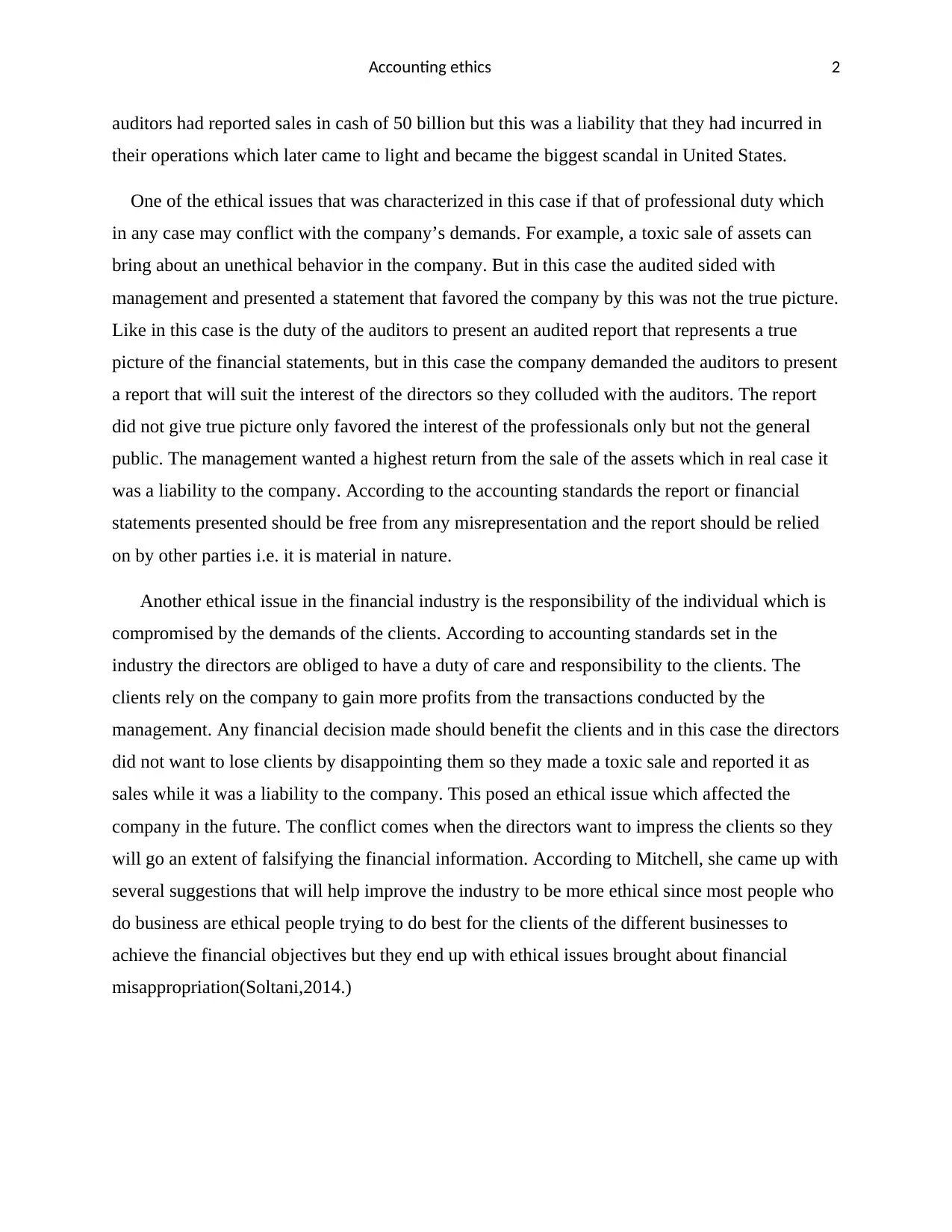
Accounting ethics 2
auditors had reported sales in cash of 50 billion but this was a liability that they had incurred in
their operations which later came to light and became the biggest scandal in United States.
One of the ethical issues that was characterized in this case if that of professional duty which
in any case may conflict with the company’s demands. For example, a toxic sale of assets can
bring about an unethical behavior in the company. But in this case the audited sided with
management and presented a statement that favored the company by this was not the true picture.
Like in this case is the duty of the auditors to present an audited report that represents a true
picture of the financial statements, but in this case the company demanded the auditors to present
a report that will suit the interest of the directors so they colluded with the auditors. The report
did not give true picture only favored the interest of the professionals only but not the general
public. The management wanted a highest return from the sale of the assets which in real case it
was a liability to the company. According to the accounting standards the report or financial
statements presented should be free from any misrepresentation and the report should be relied
on by other parties i.e. it is material in nature.
Another ethical issue in the financial industry is the responsibility of the individual which is
compromised by the demands of the clients. According to accounting standards set in the
industry the directors are obliged to have a duty of care and responsibility to the clients. The
clients rely on the company to gain more profits from the transactions conducted by the
management. Any financial decision made should benefit the clients and in this case the directors
did not want to lose clients by disappointing them so they made a toxic sale and reported it as
sales while it was a liability to the company. This posed an ethical issue which affected the
company in the future. The conflict comes when the directors want to impress the clients so they
will go an extent of falsifying the financial information. According to Mitchell, she came up with
several suggestions that will help improve the industry to be more ethical since most people who
do business are ethical people trying to do best for the clients of the different businesses to
achieve the financial objectives but they end up with ethical issues brought about financial
misappropriation(Soltani,2014.)
auditors had reported sales in cash of 50 billion but this was a liability that they had incurred in
their operations which later came to light and became the biggest scandal in United States.
One of the ethical issues that was characterized in this case if that of professional duty which
in any case may conflict with the company’s demands. For example, a toxic sale of assets can
bring about an unethical behavior in the company. But in this case the audited sided with
management and presented a statement that favored the company by this was not the true picture.
Like in this case is the duty of the auditors to present an audited report that represents a true
picture of the financial statements, but in this case the company demanded the auditors to present
a report that will suit the interest of the directors so they colluded with the auditors. The report
did not give true picture only favored the interest of the professionals only but not the general
public. The management wanted a highest return from the sale of the assets which in real case it
was a liability to the company. According to the accounting standards the report or financial
statements presented should be free from any misrepresentation and the report should be relied
on by other parties i.e. it is material in nature.
Another ethical issue in the financial industry is the responsibility of the individual which is
compromised by the demands of the clients. According to accounting standards set in the
industry the directors are obliged to have a duty of care and responsibility to the clients. The
clients rely on the company to gain more profits from the transactions conducted by the
management. Any financial decision made should benefit the clients and in this case the directors
did not want to lose clients by disappointing them so they made a toxic sale and reported it as
sales while it was a liability to the company. This posed an ethical issue which affected the
company in the future. The conflict comes when the directors want to impress the clients so they
will go an extent of falsifying the financial information. According to Mitchell, she came up with
several suggestions that will help improve the industry to be more ethical since most people who
do business are ethical people trying to do best for the clients of the different businesses to
achieve the financial objectives but they end up with ethical issues brought about financial
misappropriation(Soltani,2014.)
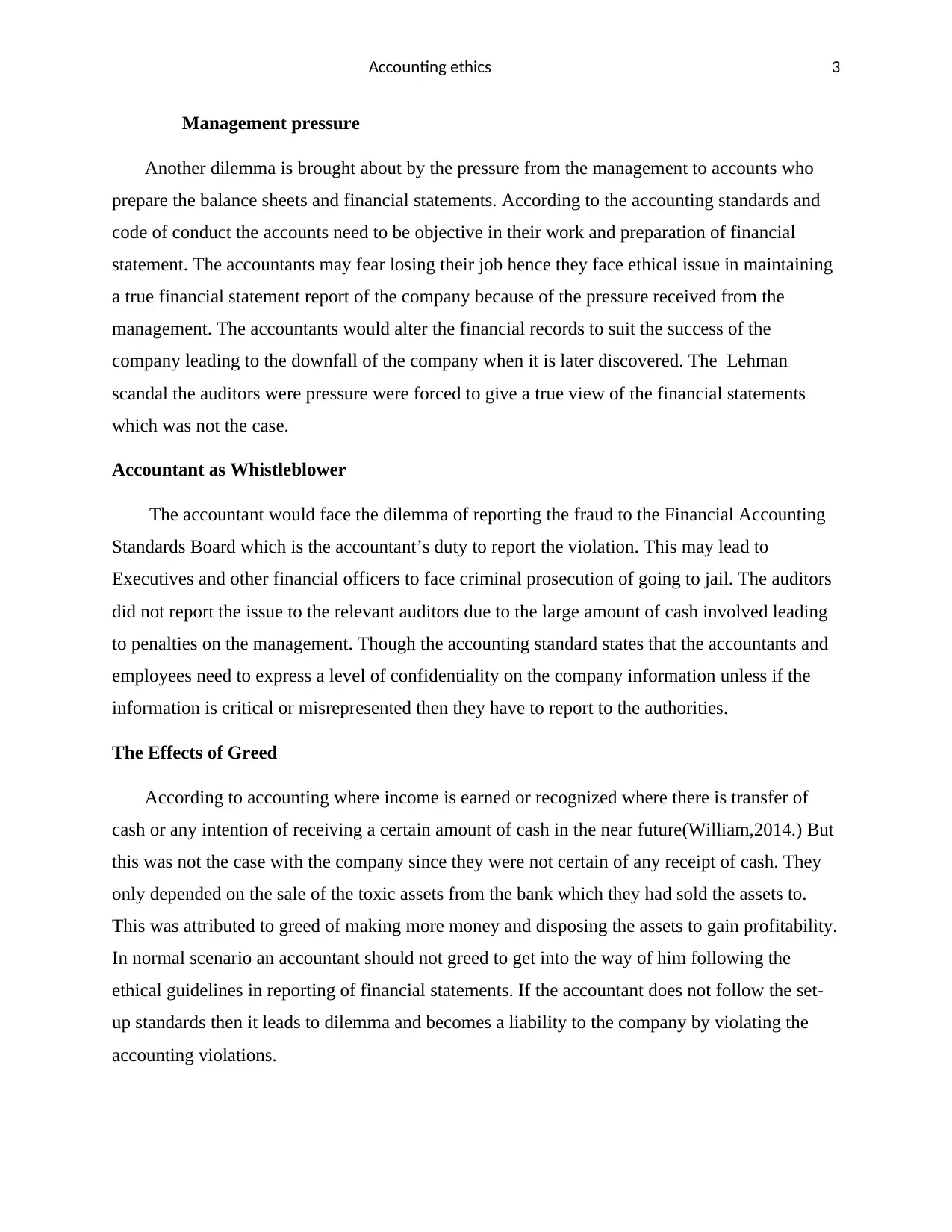
Accounting ethics 3
Management pressure
Another dilemma is brought about by the pressure from the management to accounts who
prepare the balance sheets and financial statements. According to the accounting standards and
code of conduct the accounts need to be objective in their work and preparation of financial
statement. The accountants may fear losing their job hence they face ethical issue in maintaining
a true financial statement report of the company because of the pressure received from the
management. The accountants would alter the financial records to suit the success of the
company leading to the downfall of the company when it is later discovered. The Lehman
scandal the auditors were pressure were forced to give a true view of the financial statements
which was not the case.
Accountant as Whistleblower
The accountant would face the dilemma of reporting the fraud to the Financial Accounting
Standards Board which is the accountant’s duty to report the violation. This may lead to
Executives and other financial officers to face criminal prosecution of going to jail. The auditors
did not report the issue to the relevant auditors due to the large amount of cash involved leading
to penalties on the management. Though the accounting standard states that the accountants and
employees need to express a level of confidentiality on the company information unless if the
information is critical or misrepresented then they have to report to the authorities.
The Effects of Greed
According to accounting where income is earned or recognized where there is transfer of
cash or any intention of receiving a certain amount of cash in the near future(William,2014.) But
this was not the case with the company since they were not certain of any receipt of cash. They
only depended on the sale of the toxic assets from the bank which they had sold the assets to.
This was attributed to greed of making more money and disposing the assets to gain profitability.
In normal scenario an accountant should not greed to get into the way of him following the
ethical guidelines in reporting of financial statements. If the accountant does not follow the set-
up standards then it leads to dilemma and becomes a liability to the company by violating the
accounting violations.
Management pressure
Another dilemma is brought about by the pressure from the management to accounts who
prepare the balance sheets and financial statements. According to the accounting standards and
code of conduct the accounts need to be objective in their work and preparation of financial
statement. The accountants may fear losing their job hence they face ethical issue in maintaining
a true financial statement report of the company because of the pressure received from the
management. The accountants would alter the financial records to suit the success of the
company leading to the downfall of the company when it is later discovered. The Lehman
scandal the auditors were pressure were forced to give a true view of the financial statements
which was not the case.
Accountant as Whistleblower
The accountant would face the dilemma of reporting the fraud to the Financial Accounting
Standards Board which is the accountant’s duty to report the violation. This may lead to
Executives and other financial officers to face criminal prosecution of going to jail. The auditors
did not report the issue to the relevant auditors due to the large amount of cash involved leading
to penalties on the management. Though the accounting standard states that the accountants and
employees need to express a level of confidentiality on the company information unless if the
information is critical or misrepresented then they have to report to the authorities.
The Effects of Greed
According to accounting where income is earned or recognized where there is transfer of
cash or any intention of receiving a certain amount of cash in the near future(William,2014.) But
this was not the case with the company since they were not certain of any receipt of cash. They
only depended on the sale of the toxic assets from the bank which they had sold the assets to.
This was attributed to greed of making more money and disposing the assets to gain profitability.
In normal scenario an accountant should not greed to get into the way of him following the
ethical guidelines in reporting of financial statements. If the accountant does not follow the set-
up standards then it leads to dilemma and becomes a liability to the company by violating the
accounting violations.
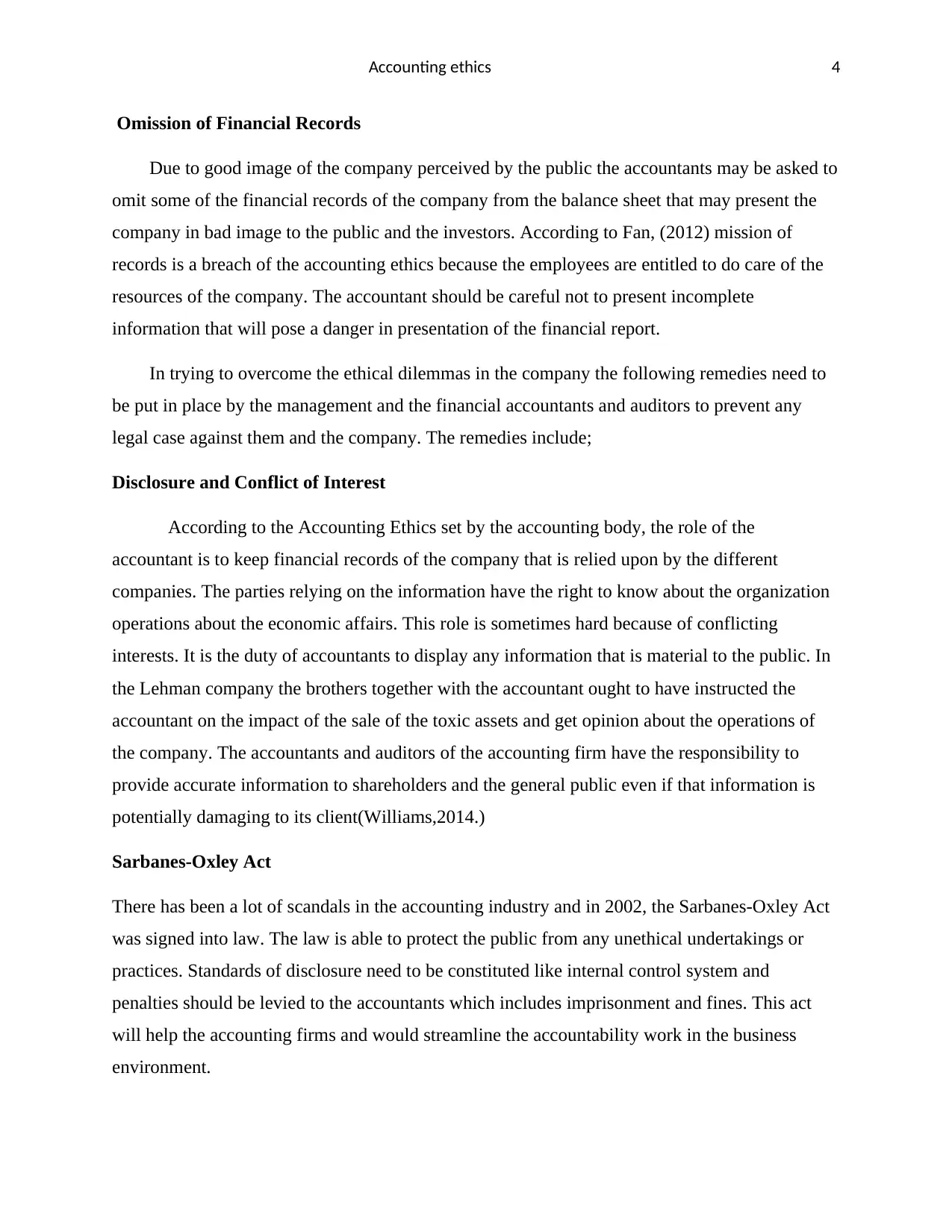
Accounting ethics 4
Omission of Financial Records
Due to good image of the company perceived by the public the accountants may be asked to
omit some of the financial records of the company from the balance sheet that may present the
company in bad image to the public and the investors. According to Fan, (2012) mission of
records is a breach of the accounting ethics because the employees are entitled to do care of the
resources of the company. The accountant should be careful not to present incomplete
information that will pose a danger in presentation of the financial report.
In trying to overcome the ethical dilemmas in the company the following remedies need to
be put in place by the management and the financial accountants and auditors to prevent any
legal case against them and the company. The remedies include;
Disclosure and Conflict of Interest
According to the Accounting Ethics set by the accounting body, the role of the
accountant is to keep financial records of the company that is relied upon by the different
companies. The parties relying on the information have the right to know about the organization
operations about the economic affairs. This role is sometimes hard because of conflicting
interests. It is the duty of accountants to display any information that is material to the public. In
the Lehman company the brothers together with the accountant ought to have instructed the
accountant on the impact of the sale of the toxic assets and get opinion about the operations of
the company. The accountants and auditors of the accounting firm have the responsibility to
provide accurate information to shareholders and the general public even if that information is
potentially damaging to its client(Williams,2014.)
Sarbanes-Oxley Act
There has been a lot of scandals in the accounting industry and in 2002, the Sarbanes-Oxley Act
was signed into law. The law is able to protect the public from any unethical undertakings or
practices. Standards of disclosure need to be constituted like internal control system and
penalties should be levied to the accountants which includes imprisonment and fines. This act
will help the accounting firms and would streamline the accountability work in the business
environment.
Omission of Financial Records
Due to good image of the company perceived by the public the accountants may be asked to
omit some of the financial records of the company from the balance sheet that may present the
company in bad image to the public and the investors. According to Fan, (2012) mission of
records is a breach of the accounting ethics because the employees are entitled to do care of the
resources of the company. The accountant should be careful not to present incomplete
information that will pose a danger in presentation of the financial report.
In trying to overcome the ethical dilemmas in the company the following remedies need to
be put in place by the management and the financial accountants and auditors to prevent any
legal case against them and the company. The remedies include;
Disclosure and Conflict of Interest
According to the Accounting Ethics set by the accounting body, the role of the
accountant is to keep financial records of the company that is relied upon by the different
companies. The parties relying on the information have the right to know about the organization
operations about the economic affairs. This role is sometimes hard because of conflicting
interests. It is the duty of accountants to display any information that is material to the public. In
the Lehman company the brothers together with the accountant ought to have instructed the
accountant on the impact of the sale of the toxic assets and get opinion about the operations of
the company. The accountants and auditors of the accounting firm have the responsibility to
provide accurate information to shareholders and the general public even if that information is
potentially damaging to its client(Williams,2014.)
Sarbanes-Oxley Act
There has been a lot of scandals in the accounting industry and in 2002, the Sarbanes-Oxley Act
was signed into law. The law is able to protect the public from any unethical undertakings or
practices. Standards of disclosure need to be constituted like internal control system and
penalties should be levied to the accountants which includes imprisonment and fines. This act
will help the accounting firms and would streamline the accountability work in the business
environment.
Secure Best Marks with AI Grader
Need help grading? Try our AI Grader for instant feedback on your assignments.
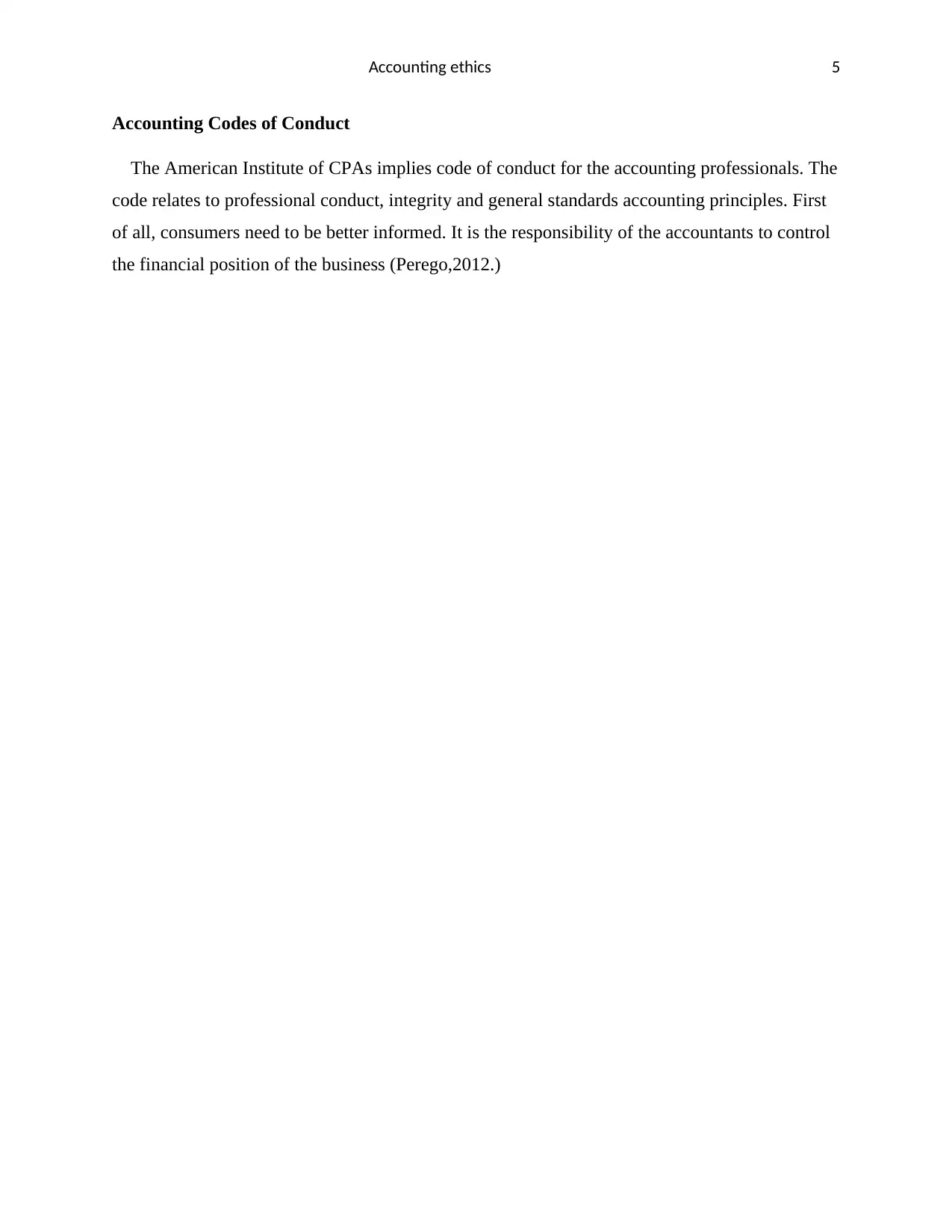
Accounting ethics 5
Accounting Codes of Conduct
The American Institute of CPAs implies code of conduct for the accounting professionals. The
code relates to professional conduct, integrity and general standards accounting principles. First
of all, consumers need to be better informed. It is the responsibility of the accountants to control
the financial position of the business (Perego,2012.)
Accounting Codes of Conduct
The American Institute of CPAs implies code of conduct for the accounting professionals. The
code relates to professional conduct, integrity and general standards accounting principles. First
of all, consumers need to be better informed. It is the responsibility of the accountants to control
the financial position of the business (Perego,2012.)
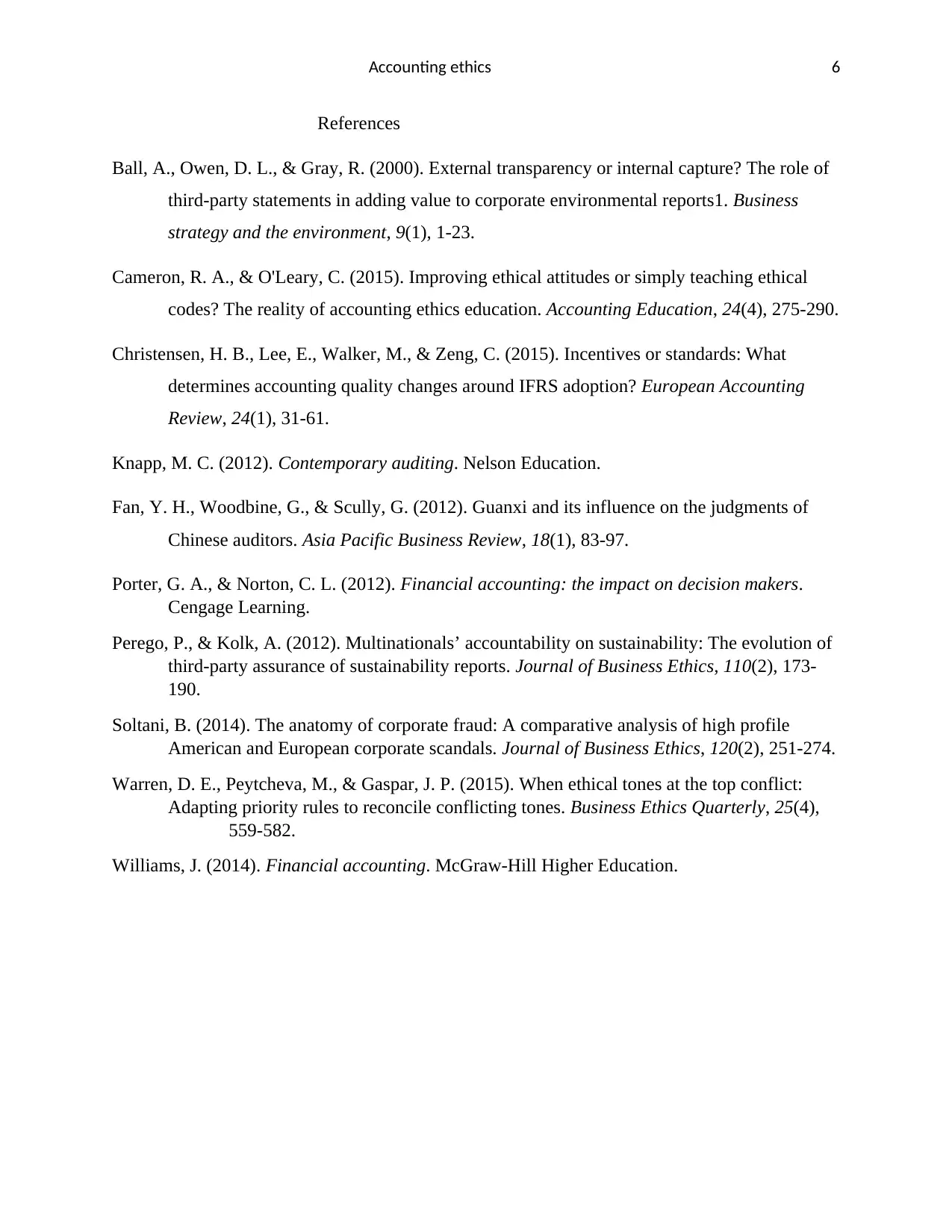
Accounting ethics 6
References
Ball, A., Owen, D. L., & Gray, R. (2000). External transparency or internal capture? The role of
third‐party statements in adding value to corporate environmental reports1. Business
strategy and the environment, 9(1), 1-23.
Cameron, R. A., & O'Leary, C. (2015). Improving ethical attitudes or simply teaching ethical
codes? The reality of accounting ethics education. Accounting Education, 24(4), 275-290.
Christensen, H. B., Lee, E., Walker, M., & Zeng, C. (2015). Incentives or standards: What
determines accounting quality changes around IFRS adoption? European Accounting
Review, 24(1), 31-61.
Knapp, M. C. (2012). Contemporary auditing. Nelson Education.
Fan, Y. H., Woodbine, G., & Scully, G. (2012). Guanxi and its influence on the judgments of
Chinese auditors. Asia Pacific Business Review, 18(1), 83-97.
Porter, G. A., & Norton, C. L. (2012). Financial accounting: the impact on decision makers.
Cengage Learning.
Perego, P., & Kolk, A. (2012). Multinationals’ accountability on sustainability: The evolution of
third-party assurance of sustainability reports. Journal of Business Ethics, 110(2), 173-
190.
Soltani, B. (2014). The anatomy of corporate fraud: A comparative analysis of high profile
American and European corporate scandals. Journal of Business Ethics, 120(2), 251-274.
Warren, D. E., Peytcheva, M., & Gaspar, J. P. (2015). When ethical tones at the top conflict:
Adapting priority rules to reconcile conflicting tones. Business Ethics Quarterly, 25(4),
559-582.
Williams, J. (2014). Financial accounting. McGraw-Hill Higher Education.
References
Ball, A., Owen, D. L., & Gray, R. (2000). External transparency or internal capture? The role of
third‐party statements in adding value to corporate environmental reports1. Business
strategy and the environment, 9(1), 1-23.
Cameron, R. A., & O'Leary, C. (2015). Improving ethical attitudes or simply teaching ethical
codes? The reality of accounting ethics education. Accounting Education, 24(4), 275-290.
Christensen, H. B., Lee, E., Walker, M., & Zeng, C. (2015). Incentives or standards: What
determines accounting quality changes around IFRS adoption? European Accounting
Review, 24(1), 31-61.
Knapp, M. C. (2012). Contemporary auditing. Nelson Education.
Fan, Y. H., Woodbine, G., & Scully, G. (2012). Guanxi and its influence on the judgments of
Chinese auditors. Asia Pacific Business Review, 18(1), 83-97.
Porter, G. A., & Norton, C. L. (2012). Financial accounting: the impact on decision makers.
Cengage Learning.
Perego, P., & Kolk, A. (2012). Multinationals’ accountability on sustainability: The evolution of
third-party assurance of sustainability reports. Journal of Business Ethics, 110(2), 173-
190.
Soltani, B. (2014). The anatomy of corporate fraud: A comparative analysis of high profile
American and European corporate scandals. Journal of Business Ethics, 120(2), 251-274.
Warren, D. E., Peytcheva, M., & Gaspar, J. P. (2015). When ethical tones at the top conflict:
Adapting priority rules to reconcile conflicting tones. Business Ethics Quarterly, 25(4),
559-582.
Williams, J. (2014). Financial accounting. McGraw-Hill Higher Education.
1 out of 6
Related Documents
Your All-in-One AI-Powered Toolkit for Academic Success.
+13062052269
info@desklib.com
Available 24*7 on WhatsApp / Email
![[object Object]](/_next/static/media/star-bottom.7253800d.svg)
Unlock your academic potential
© 2024 | Zucol Services PVT LTD | All rights reserved.





